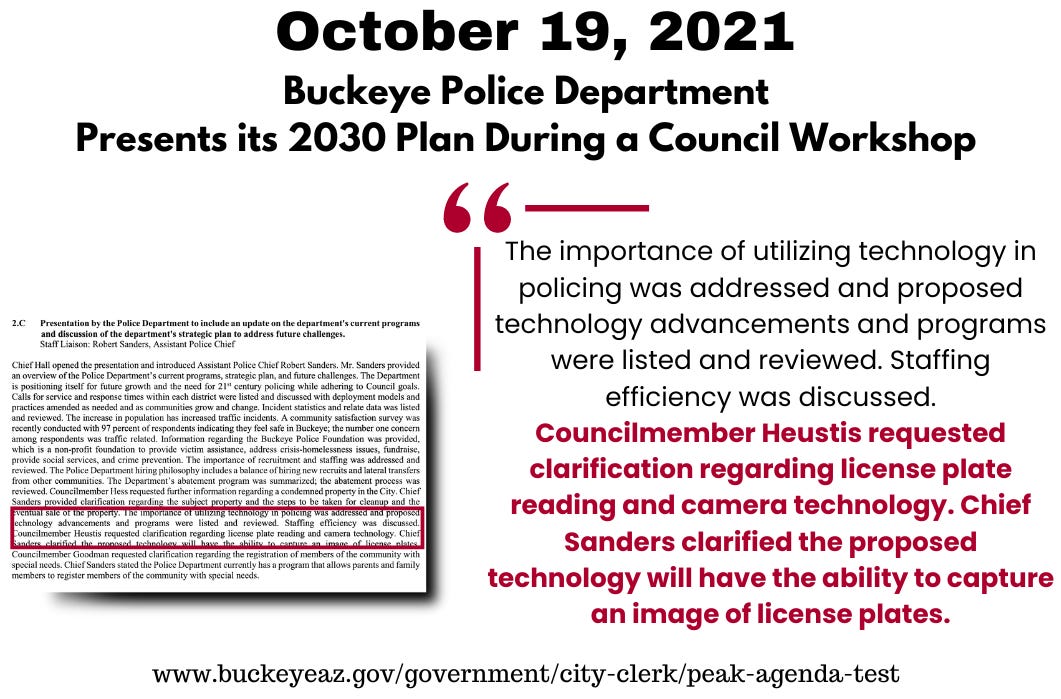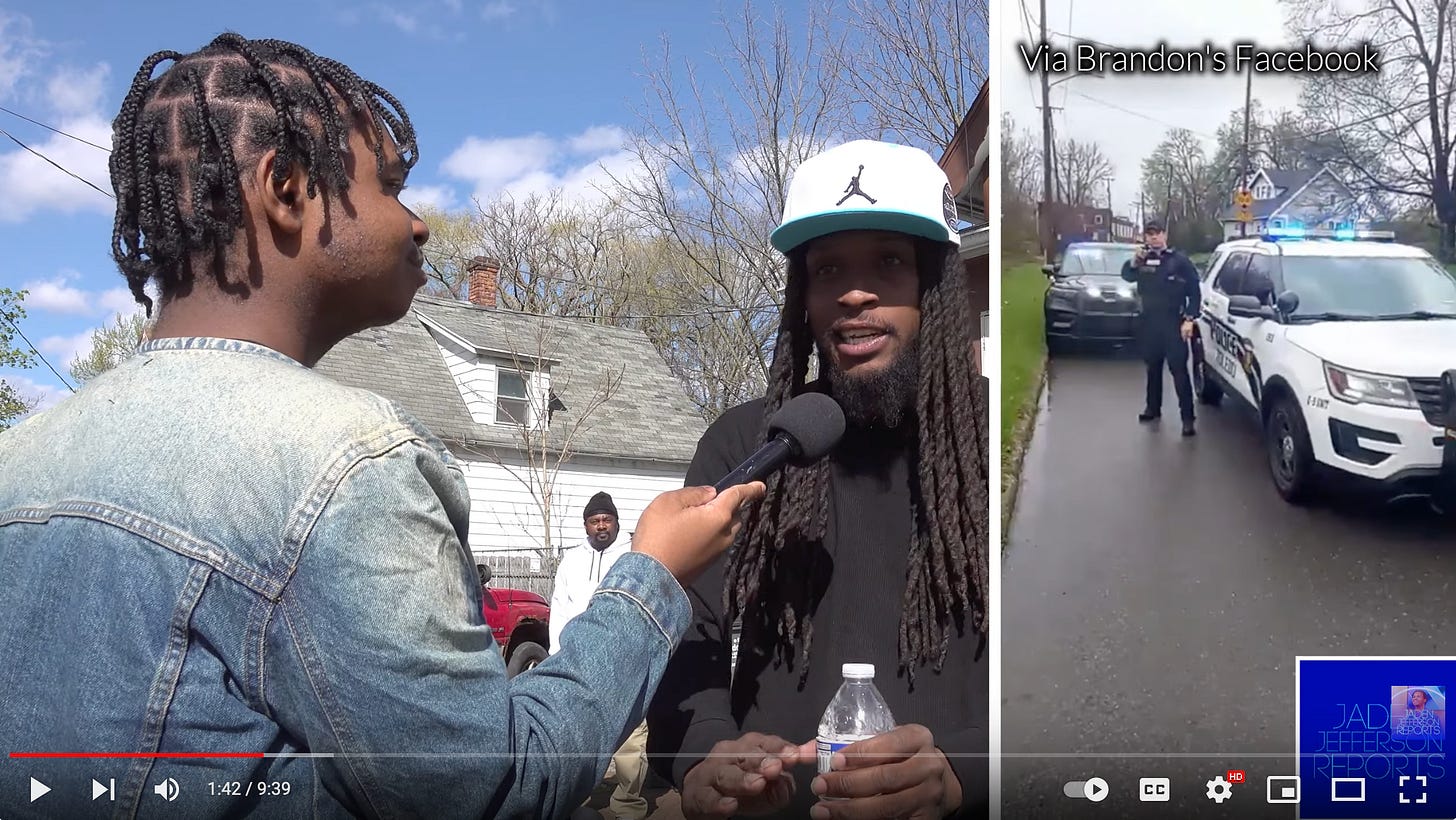Power of the People's Consent
Will our lawmakers use our tax dollars to track our every move? We've uncovered serious concerns with AI-driven mass surveillance now in the West Valley.
Hope you all enjoyed a wonderful Mother’s Day! I feel fortunate to have been able to raise my child in the West Valley, and hope to hang on to what’s made this area of the nation so special.
Let’s dive in.
USE OF AI TO MASS SURVEIL THE PEOPLE
It’s 2024. Technology is here. But is it a “given” that we must comply with installation of powerful surveillance in our everyday lives?
Should we have it because everyone else does?
In April, Goodyear lawmakers were caught by surprise to find out license plate readers were already purchased and installed in this All-America City.
The message being sold to the people is a concept of basic “license plate readers.” But our investigation shows the technology behind it is so much more commanding.
National privacy experts weighed in on my podcast about the powerful crime-fighting tool watching cars move in and out of West Valley cities.
Members of council began to touch the surface about the depth of the technology’s capability and how it will fit into its pieced together, real-time crime center. Here is the discussion from a Goodyear work session in April 2024.
On behalf several managers, mayor and council, a Goodyear city spokesperson declined an interview. In an email response, I’m told they’ll be happy to provide me an interview after the next work session - which is tonight - reviewing the mass surveillance technology being used in Goodyear.
A TALE OF TWO CITIES
For the last two years, neighboring Buckeye, Arizona has planned for AI security cameras by design. Also known as license plate readers - Buckeye purchased security cameras operated through a company called Flock Safety. (We’ve tried reaching out for comment from Flock, too.)
On a topic as important as mass surveillance, we did not edit this interview with Buckeye Police Department PIO Carissa Planalp.
Like numerous police departments across the country, Planalp gives several examples citing how LPRs, or license plate readers, have been beneficial in solving crimes and helping people in need. (Please reference the video for helpful crime-fighting resources provided by the Buckeye Police Department.)
The city confirms Buckeye Police presented lawmakers with the camera security technology during a budget planning session in October 2021 as part of its 2030 Public Safety Initiative. “The initiative was approved by city council as part of the Strategic Plan. BPD has 40 approved locations for Flock license plate readers,” writes Planalp.
Goodyear lawmakers also were told of license plate readers during a budget planning meeting.
In stark contrast, though, Goodyear’s council discovered 16 AI-driven mass surveillance cameras were already purchased, and 3 cameras installed prior to their knowledge.
Goodyear Police are asking for funds to purchase another 25 cameras - bringing the total to 41 cameras throughout the city for FY2025.
NOTHING TO HIDE
When told of the technology in the West Valley, the common response from most people is, “I’ve got nothing to hide.”
Would they change their tune if they knew the error rate of such technology?
Jake Wiener of the Electronic Privacy Information Center tells us the error rate could run anywhere from 10-30%.
AI-driven mass surveillance allows the government to check your license plate against a hotlist. Sometimes, the government - and the tech companies - don’t get it right.
That was the case in at least two incidents in neighboring Litchfield Park. “Daily Independent” editor Michael McDaniel covers the Flock security camera network in West Valley cities, and cites errors across this fastest growing area of the U.S.
In 2022, a car set off an automated license plate reader system alarm in Litchfield Park. The camera system, told police the vehicle was stolen. An officer pulled over the driver for a stolen vehicle alert, but the Flock AI made a mistake.
“The Flock camera read the plate wrong as AZ:074A45G when the plate actually read AZ:D74A5G,” wrote the officer, in the Litchfield report.
Months prior, Flock’s system made another mistake. It alerted the police of a stolen vehicle where the plate was erroneously entered into the statewide MVD system that same month. The driver was “detained and then released.”
In Goodyear, the city manager and police say its license plate readers will be scanning for stolen vehicles. But do they have a plan for what to do when AI errors?
Here’s body cam video from Ohio where, “an officer received a flock alert for a stolen vehicle, but the alert was wrong.”
The victim, Brandon Upchurch, tells his side of the story. Reportedly, “Police later admitted they stopped the wrong car but still charged Upchurch with resisting arrest.”
Similar experience for this nurse who says Memphis police pulled her over after a license plate reader identified her vehicle as stolen. As she describes, the license plate reader couldn’t differentiate state vs. state. “The stolen tag was actually in Pennsylvania,” a state a thousand miles away, explains Iesha Jones.
Jones says she was put in handcuffs and frisked. Watch.
Now, Jones’ husband is concerned she’ll be pulled over again because of the same error. An error that Jake Wiener of the Electronic Privacy Information Center tells me is hard to fix.
CAN THE CONSTITUTION KEEP UP WITH TECHNOLOGY?
In the past 25 years, I’ve covered the combo of privacy and technology. Today, Artificial intelligence - AI - creates all new questions. Here in the West Valley, how is it used and who’s using it?
Will the introduction of AI cause us to lose our privacy— forever?
HOA’s, churches, hospitals, malls, cities and others pay private companies for access to a surveillance network where your private data is tracked. In the West Valley, most cities know your comings and goings.
And it’s possible your tax dollars could be paid to a tech giant whose errors can lead to your wrongful arrest. And fighting the case in court could be costly.
IPVM reports Flock Safety won the dismissal of 28-year-old Lyft driver Michael Smith’s lawsuit seeking damages for a wrongful traffic stop. The company’s Motion to Dismiss states:
“Flock’s LPR cameras are connected to the FBI’s National Crime Information Center (“NCIC”) Hot List and are compliant with the FBI’s Criminal Justice Information Services (“CJIS”).” View here.
The case, alleging the man was erroneously flagged to police as a human trafficking suspect by the company's LPR system, is not necessarily over — although the plaintiff faces significant challenges if he appeals. IPVM writes.
A quick search will turn up lots of examples. From police arresting the wrong man for murder to a pair of sisters wrongfully pulled over… while a child was in the backseat… has us asking, “Is this the right time for AI technology in our city?”
Ask this student athlete and high school quarterback who was reportedly wrongfully stopped and handcuffed on his way home from school.
The other concern is privacy. Shouldn’t innocent people be able to move about freely in a free society?
Lisa Femia of the Electronic Fronteir Foundation gave me her thoughts on privacy rights and the Constitution in the U.S.
“Since ALPRs typically collect information on everyone—not just hot-listed vehicles—officers can use a plate, a partial plate, or a physical address to search and analyze historical data.” The Electronic Frontier Foundation provides an extensive review of license plate readers here. “The data generally does not include the driver’s name. However, law enforcement officers can use other databases to connect individual names with their license plate numbers.”
LOOK ME IN THE EYES
Last week, college protestors wore masks to cover their faces… but did they realize AI cameras only needed a view of their eyes?
Take a listen to this:
“Every single image, even at night now, goes into an AI generator and will tell you who that individual is. I hire people. I have a lot of companies. I hire thousands of people. Within weeks, I’m going to be able - doing a background check - I’m gonna find this. It’s gonna be on the dark web. The services you buy. It’s only $5,000 to do a deep dark check. ‘Here’s your resume showing you burning a flag.’ See that one? That goes in this pile. Cause I can get the same person’s talent in this pile that’s not burning anything.”
“You’ll never know why you didn’t get a mortgage. You’ll never know why you didn’t get into college. You’ll never know why you didn’t get the job because we see you now.” -Kevin O’Leary, May 2024
JEN’S TWO CENTS
Privacy is a choice.
As residents, can we reclaim our privacy?
All we can hope is for our lawmakers to ask the important questions and consider concerns voiced by people - and real victims of this technology - throughout the country.
City Council Work Session - Monday, May 13, 2024 at 5pm
City Hall - Canyon Trails 1 & 2
1900 N. Civic Square, Goodyear, AZ 85395
Questions we’d like to hear answered:
Who - the person, not the department - is overseeing AI-driven mass surveillance in Goodyear?
Who has access to the data? How many people, exactly?
Since we already know Flock stores ‘data’ indefinitely, what is Goodyear’s contract with Flock for the amount of time ‘images’ are stored in its system?
Does Goodyear have a plan to correct inaccurate data stored in Flock’s system which can incorrectly misread a license plate?
Does Goodyear plan to surveil minors in schools using AI-driven predictive technology as part of its crime center?
Will Goodyear use AI technology to surveil people at protests, gun shops/shows, and churches? Will private citizens’ historical location be used to put them in quarantine if another pandemic arises?
Will Goodyear lawmakers hold public interviews with future police chief candidates and ask about their philosophies on AI-driven mass surveillance?
If you would like to watch upcoming videos and discussions on this topic, please subscribe and follow the “Jen and Friends” AI-Driven Mass Surveillance in the West Valley YouTube playlist here.








